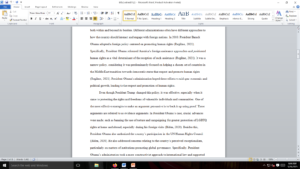The country’s foreign policy
This is a continuation of the first and second assignments and uses your accumulated research. Imagine you are two different lobbyists, supporting two different sides of the policy issue you wrote about in the Week 6 assignment, Analyzing Policy.
Submit your revisions from the Week 3 assignment, Historical Perspective and the Week 6 assignment, Analyzing Policy based on your professor’s feedback. You will be graded on your revisions. Then, write a 4–5 page paper in which you:
- Write a one-page position in favor of the policy.
- Write a one-page position against the policy.
- Write a one-page response to the argument in favor of the policy.
- Write a one-page response to the argument against the policy.
- Use at least two of the following arguments from Chapter 10 in your paper: normative, positive, anecdote, and evidence arguments. Clearly label each to receive credit.
- Include at least four peer-reviewed references (no more than five years old) from material outside the textbook. Note: Appropriate peer-reviewed references include scholarly articles and governmental websites. Wikipedia, other wikis, and any other websites ending in anything other than “.gov” do not qualify as peer-reviewed. Use Basic Search: Strayer University Online Library to identify references.
Requirements: 4-5 pages |
Answer preview
In his 2011 speech at the State Department, President Obama intimated that America’s support for universal human rights was a top priority, which should be translated into concrete actions, supported by all his administration’s strategic, diplomatic, and economic tools. Even though his administration did, at times, live up to this rhetoric, it was not backed up by firm action. I will use normative arguments to support this claim. Generally, normative arguments focus on using the immoral or moral attributes of actions or their consequences as a persuasive tool. Additionally, these arguments are anchored on shared norms and values that guide or regulate a society’s decision-making and conduct. Throughout his 8-year tenure, President Obama’s major human rights decisions were characterized by hypocrisy (Roth, 2017). Specifically, the lack of transparency and accountability adversely affected the legitimacy of his human rights actions. One of the major criticisms against President Obama’s perceived human
[1462 Words]

The country’s foreign policy

